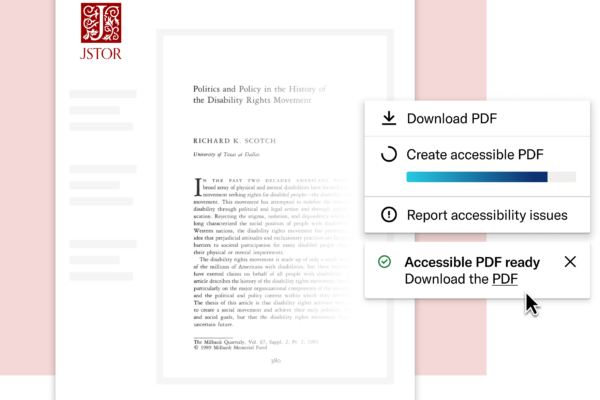
At ITHAKA, we are dedicated to improving access to knowledge and education for people around the world, and it is a privilege to pursue this mission with our broad community of librarians, publishers, educators, administrators, funders, researchers, and students. Collaborating with all of you has been an incredibly rewarding journey, and we couldn’t be more grateful for your engagement and support.
We’re pleased to share an update on our progress in 2023. With your help, we achieved significant milestones:
Making more content universally accessible
- JSTOR Access in Prisons: Incarcerated students at 1,000 prisons across the United States as well as Australia, the British Virgin Islands, Canada, Ghana, Jamaica, Morocco, and the United Kingdom now have full access to JSTOR’s archival collections.
- Path to Open: Forty-two presses and 87 libraries now support our new pilot to enable sustainable, open access publishing of diverse scholarly books—and the first 100 titles are now live.
- A cost-effective new fee model: More than 1,700 libraries have expanded their holdings through a new model that provides comprehensive access to JSTOR archival journals and primary sources.
- JSTOR- and Portico-based infrastructure services: A total of 350 libraries are now cataloging, sharing, and preserving 2,500 special collections, including audio and video, through our digital infrastructure—amplifying the reach of this content and ensuring its affordable long-term management and preservation.
Preserving the scholarly record
- Preservation of at-risk materials: Ten collections are now part of Portico’s work to preserve content from underrepresented communities and emerging forms of complex scholarship. Collections being preserved include Against All Odds: The first Black legislators in Mississippi; Bracero History Archive; Ozarks Afro-American Heritage Museum Online; and The Pilbara Aboriginal Strike.
Improving the utility of knowledge
- Artstor on JSTOR: Artstor’s cross-disciplinary collection of more than two million images is now discoverable alongside the extensive academic content on JSTOR, empowering users to harness visual materials for teaching and learning more effectively than ever.
- Text analysis: Constellate’s Text Analysis Pedagogy Institute provided courses on text analysis and data skills to 553 faculty, librarians, and students from 273 institutions.
- Generative AI: Currently, 52,000 JSTOR users have signed on to test a new generative AI research assistant, developed to help our community of librarians, faculty, and students find paths to responsible, ethical, and productive uses of AI. In addition, Ithaka S+R is leading a collaborative research project about these technologies. Initial findings indicate colleges and universities are moving away from framing AI primarily as an academic integrity problem in favor of assessing its appropriate pedagogical uses. They are also concluding that responding effectively to AI requires coordination across multiple universities.
Supporting higher education in navigating change
- Reducing barriers to education: Ithaka S+R’s collaborative project with The City University of New York (CUNY) produced a tool that enables students and advisors to plan ahead so they won’t lose credits when transferring to a new institution. We’re now working on expanding this initiative beyond CUNY.
- Insight into current issues: Our research aligns with larger trends in scholarly communication and higher education, and Ithaka S+R has published extensively on topics such as open access, supporting college teaching, and streamlining research data support services.
In 2024, we’ll continue to grow our impact in these same areas that reflect our nonprofit mission and the higher education communities’ need for services that enable openness, sustainability, preservation, and innovation. Learn more about our key priorities for the upcoming year.
Thank you for your continued engagement in this important work. Here’s to a successful 2024.



